Easy Bleeding Colon Upon Touching With Instrumetn
Colon cancer
Colorectal cancer; Cancer - colon; Rectal cancer; Cancer - rectum; Adenocarcinoma - colon; Colon - adenocarcinoma; Colon carcinoma
Colorectal cancer is cancer that starts in the large intestine (colon) or the rectum (end of the colon).
Other types of cancer can affect the colon. These include lymphoma, carcinoid tumors, melanoma, and sarcomas. These are rare. In this article, colon cancer refers to colorectal cancer only.

The barium enema is a valuable diagnostic tool that helps detect abnormalities in the large intestine (colon). The barium enema, along with colonoscopy, remain standards in the diagnosis of colon cancer, ulcerative colitis, and other diseases of the colon.

There are 3 basic tests for colon cancer; a stool test (to check for blood), sigmoidoscopy (inspection of the lower colon), and colonoscopy (inspection of the entire colon). All 3 are effective in catching cancers in the early stages, when treatment is most beneficial.

The esophagus, stomach, large and small intestine, aided by the liver, gallbladder and pancreas convert the nutritive components of food into energy and break down the non-nutritive components into waste to be excreted.

A barium enema in a patient with cancer of the rectum.

A barium enema in a patient with cancer of the large bowel (sigmoid area).

This CT scan of the upper abdomen shows multiple tumors in the liver and spleen that have spread (metastasized) from an original intestinal cancer (carcinoma).

The large intestine is a long hollow organ lined with mucous membrane (mucosa). Muscle layers wrap around the entire length and help move food material through to the rectum.

The staging of a carcinoma has to do with the size of the tumor, and the degree to which it has penetrated. When the tumor is small and has not penetrated the mucosal layer, it is said to be stage I cancer. Stage II tumors are into the muscle wall, and stage III involves nearby lymph nodes. The rare stage IV cancer has spread (metastasized) to remote organs.
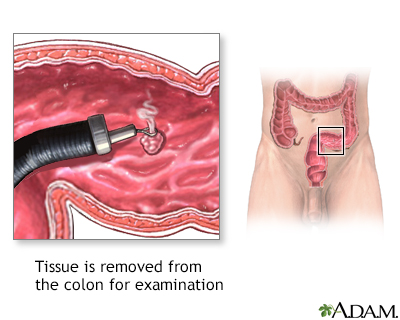
When polyps are discovered in a sigmoidoscopy (an inspection of the lower third of the large intestine), they are retrieved to be tested for cancer. If a large amount of polyps are found, a more thorough examination of the entire length of the large intestine (a colonoscopy) may be recommended.
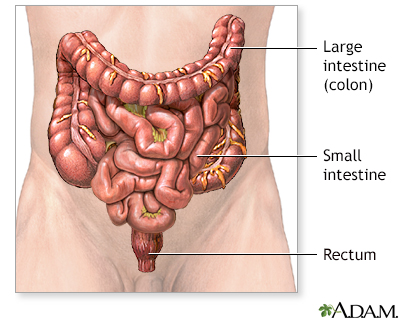
The colon, or large intestine, is a muscular tube that begins at the end of the small intestine and ends at the rectum. The colon absorbs water from liquid stool that is delivered to it from the small intestine.
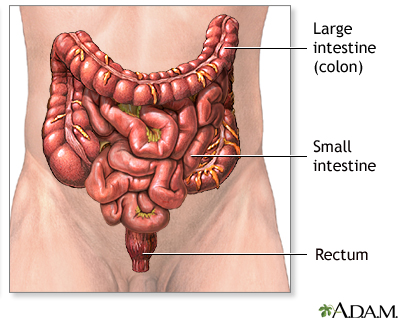
The colon, or large intestine, is a digestive organ located in the abdomen. The large intestine begins at the end of the small intestine and extends through the rectum and anus.
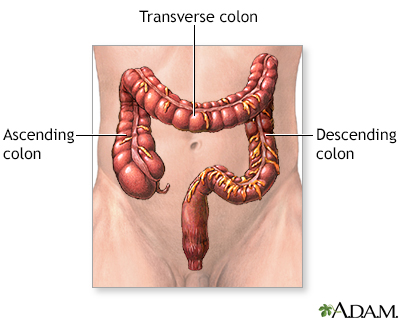
The large bowel [large intestine or the colon] is part of the digestive system. It runs from the small intestine to the rectum. It is made up of three portions; the ascending, transverse and descending colon. The ascending colon is sometimes referred to as the right colon; the descending colon is sometimes referred to as the left, or sigmoid colon.
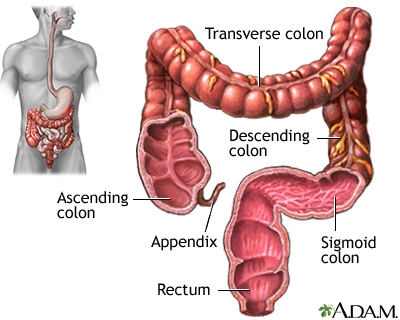
The large intestine is the portion of the digestive system most responsible for absorption of water from the indigestible residue of food. The ileocecal valve of the ileum (small intestine) passes material into the large intestine at the cecum. Material passes through the ascending, transverse, descending and sigmoid portions of the colon, and finally into the rectum. From the rectum, the waste is expelled from the body.
Colon cancer may not be talked about as often as other cancers, like breast cancer, prostate or lung cancer, but it's actually one of the leading causes of cancer deaths. It is for this reason it's very important to stay on top of your colon health. The colon is your large intestine, the long, upside-down U-shaped tube that is toward the end of the line for getting rid of waste in your body. Colon cancer can start in the lining of the intestine, or at the end of it, called the rectum. Let's try to better understand Colon cancer. You're more likely to get the disease if you're over age 60, especially if you have a family history of colon cancer, inflammatory bowel disease, diabetes, or obesity. Smoking cigarettes and drinking alcohol has also been found to increase your risk of getting colon cancer. Although the data are not consistent, eating red meat or processed meats may increase the risks of colon cancer as well. Lean, unprocessed red meat, may be associated with less risk. If you have symptoms, they may include pain in your abdomen, blood in your stool, weight loss, or diarrhea. But hopefully, you'll get diagnosed before you have any symptoms, during a regular screening test like a colonoscopy or sigmoidoscopy. These tests use special instruments to see inside your colon and rectum to look for any cancerous or pre-cancerous growths, called polyps. If your doctor discovers that you do have colon cancer, unfortunately, you'll need to have a few more tests, including scans of your abdomen to find out whether the cancer has spread, and if so, where in your body it's located. So, how is colon cancer treated? That really depends on how aggressive your cancer is and how far it's spread, but usually colon cancer is removed with surgery, or killed with chemotherapy or radiation. You may get one, or a combination, of these treatments. Colon cancer is one of the more treatable cancers. You can be cured, especially if you catch it early. Spotting colon cancer when it's still treatable is up to you. If you're over age 45, you need to get screened. And, regular physical activity and eating at least some fruits and vegetables daily, perhaps with unprocessed wheat bran, can help prevent it. If you want to prevent colon cancer, you'll also want to avoid processed and charred red meats, and smoking, and excess calories, and alcohol.
Causes
In the United States, colorectal cancer is one of the leading causes of deaths due to cancer. Early diagnosis can often lead to a complete cure.
Almost all colon cancers start in the lining of the colon and rectum. When doctors talk about colorectal cancer, this is usually what they are talking about.
There is no single cause of colon cancer. Nearly all colon cancers begin as noncancerous (benign) polyps, which slowly develop into cancer.
You have a higher risk for colon cancer if you:
- Are older than 45
- Are African American or of eastern European descent
- Eat a lot of red or processed meats
- Have colorectal polyps
- Have inflammatory bowel disease (Crohn disease or ulcerative colitis)
- Have a family history of colon cancer
Some inherited diseases also increase the risk of developing colon cancer. One of the most common is called the Lynch syndrome.
What you eat may play a role in getting colon cancer. Colon cancer may be linked to a high-fat, low-fiber diet and to a high intake of red meat. Some studies have found that the risk does not drop if you switch to a high-fiber diet, so this link is not yet clear.
Smoking cigarettes and drinking alcohol are other risk factors for colorectal cancer.
Symptoms
Many cases of colon cancer have no symptoms. If there are symptoms, the following may indicate colon cancer:
- Abdominal pain and tenderness in the lower abdomen
- Blood in the stool
- Diarrhea, constipation, or other change in bowel habits
- Narrow stools
- Weight loss with no known reason
Exams and Tests
Through screening tests, colon cancer can be detected before symptoms develop. This is when the cancer is most curable.
Your doctor will perform a physical exam and press on your belly area. The physical exam rarely shows any problems, although the doctor may feel a lump (mass) in the abdomen. A rectal exam may reveal a mass in people with rectal cancer, but not colon cancer.
A fecal occult blood test (FOBT) may detect small amounts of blood in the stool. This may suggest colon cancer. A sigmoidoscopy, or more likely, a colonoscopy, will be done to evaluate the cause of blood in your stool.
Only a full colonoscopy can see the entire colon. This is the best screening test for colon cancer.
Blood tests may be done for those diagnosed with colorectal cancer, including:
- Complete blood count (CBC) to check for anemia
- Liver function tests
If you are diagnosed with colorectal cancer, more tests will be done to see if the cancer has spread. This is called staging. CT or MRI scans of the abdomen, pelvic area, or chest may be used to stage the cancer. Sometimes, PET scans are also used.
Stages of colon cancer are:
- Stage 0: Very early cancer on the innermost layer of the intestine
- Stage I: Cancer is in the inner layers of the colon
- Stage II: Cancer has spread through the muscle wall of the colon
- Stage III: Cancer has spread to the lymph nodes
- Stage IV: Cancer has spread to other organs outside the colon
Blood tests to detect tumor markers, such as carcinoembryonic antigen (CEA) may help the doctor follow you during and after treatment.
Treatment
Treatment depends on many things, including the stage of the cancer. Treatments may include:
- Surgery to remove the tumor
- Chemotherapy to kill cancer cells
- Radiation therapy to destroy cancerous tissue
- Targeted therapy to keep cancer from growing and spreading
SURGERY
Stage 0 colon cancer may be treated by removing the tumor using colonoscopy. For stages I, II, and III cancer, more extensive surgery is needed to remove the part of the colon that is cancerous. This surgery is called colon resection (colectomy).
CHEMOTHERAPY
Almost all people with stage III colon cancer receive chemotherapy after surgery for 3 to 6 months. This is called adjuvant chemotherapy. Even though the tumor was removed, chemotherapy is given to treat any cancer cells that may remain.
Chemotherapy is also used to improve symptoms and prolong survival in people with stage IV colon cancer.
You may receive just one type of medicine or a combination of medicines.
RADIATION
Radiation therapy is sometimes used for colon cancer.
For people with stage IV disease that has spread to the liver, treatment directed at the liver can be used. This may include:
- Burning the cancer (ablation)
- Delivering chemotherapy or radiation directly into the liver
- Freezing the cancer (cryotherapy)
- Surgery
TARGETED THERAPY
- Targeted treatment zeroes in on specific targets (molecules) in cancer cells. These targets play a role in how cancer cells grow and survive. Using these targets, the drug disables the cancer cells so they cannot spread. Targeted therapy may be given as pills or may be injected into a vein.
- You may have targeted therapy along with surgery, chemotherapy, or radiation treatment.
Support Groups
You can ease the stress of illness by joining a colon cancer support group. Sharing with others who have common experiences and problems can help you not feel alone.
Outlook (Prognosis)
In many cases, colon cancer is treatable when caught early.
How well you do depends on many things, especially the stage of the cancer. When treated at an early stage, many people survive at least 5 years after diagnosis. This is called the 5-year survival rate.
If the colon cancer does not come back (recur) within 5 years, it is considered cured. Stages I, II, and III cancers are considered possibly curable. In most cases, stage IV cancer is not considered curable, although there are exceptions.
Possible Complications
Complications may include:
- Blockage of the colon, causing bowel obstruction
- Cancer returning in the colon
- Cancer spreading to other organs or tissues (metastasis)
- Development of a second primary colorectal cancer
When to Contact a Medical Professional
Call your health care provider if you have:
- Black, tar-like stools
- Blood during a bowel movement
- Change in bowel habits
- Unexplained weight loss
Prevention
Colon cancer can almost always be caught by colonoscopy in its earliest and most curable stages. All adults age 45 and older should have a colon cancer screening. How often you should have screening depends upon the test being used.
Colon cancer screening can often find polyps before they become cancerous. Removing these polyps may prevent colon cancer.
People with certain risk factors for colon cancer may need earlier (before age 45) or more frequent testing.
Changing your diet and lifestyle is important. Medical research suggests that low-fat and high-fiber diets may help reduce your risk for colon cancer.
References
Garber JJ, Chung DC. Colonic polyps and polyposis syndromes. In: Feldman M, Friedman LS, Brandt LJ, eds. Sleisenger and Fordtran's Gastrointestinal and Liver Disease. 11th ed. Philadelphia, PA: Elsevier; 2021:chap 126.
Lawler M, Johnston B, Van Schaeybroeck S, et al. Colorectal cancer. In: Niederhuber JE, Armitage JO, Kastan MB, Doroshow JH, Tepper JE, eds. Abeloff's Clinical Oncology. 6th ed. Philadelphia, PA: Elsevier; 2020:chap 74.
National Cancer Institute website. Colorectal cancer prevention (PDQ) - health professional version.
National Comprehensive Cancer Network website. NCCN clinical practice guidelines in oncology. Colorectal cancer screening. Version 3.2021.
Qaseem A, Crandall CJ, Mustafa RA, Hicks LA, Wilt TJ; Clinical Guidelines Committee of the American College of Physicians, et al. Screening for colorectal cancer in asymptomatic average-risk adults: a guidance statement from the American College of Physicians. Ann Intern Med. 2019;171(9) :643-654. PMID: 31683290
Rex DK, Boland CR, Dominitz JA, et al. Colorectal cancer screening: recommendations for physicians and patients from the U.S. Multi-Society Task Force on Colorectal Cancer. Am J Gastroenterol. 2017;112(7):1016-1030. PMID: 28555630
US Preventive Services Task Force website. Final recommendation statement. Colorectal cancer: screening.
Version Info
Last reviewed on: 2/6/2020
Reviewed by: Todd Gersten, MD, Hematology/Oncology, Florida Cancer Specialists & Research Institute, Wellington, FL. Review provided by VeriMed Healthcare Network. Internal review and update on 08/20/2021 by David Zieve, MD, MHA, Medical Director, Brenda Conaway, Editorial Director, and the A.D.A.M. Editorial team.

caldwellambee1962.blogspot.com
Source: https://www.mountsinai.org/health-library/diseases-conditions/colon-cancer
0 Response to "Easy Bleeding Colon Upon Touching With Instrumetn"
Post a Comment